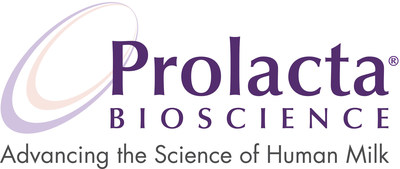Subjects: CHI, SVY
Starting 100 Percent Human Milk-Based Fortifier Early Is Associated With Improved Growth in Extremely Premature Infants, According to an Independent Study
DUARTE, Calif., July 9, 2018 /PRNewswire/ -- Prolacta Bioscience®, the pioneer in human milk-based neonatal nutritional products for premature infants, announced today that results from an independent retrospective study published in the journal Nutrition in Clinical Practice showed that infants fed an exclusive human milk diet (EHMD),[1] including Prolact+ H2MF® Human Milk-Based Human Milk Fortifier, demonstrated improved growth when fortification was started earlier at a lower feeding volume than in many standard feeding protocols.

The objective of the study, "Improving Growth for Infants ? 1250 Grams Receiving an Exclusive Human Milk Diet," was to evaluate the effect of a feeding protocol that started fortifier earlier (when the feeding volume received was 40 to 50 mL/kg/d, rather than 80 to 100 mL/kg/d) on the growth of premature infants. The infants studied, born weighing 1250 g (2 lbs 12 oz) or less, received either an EHMD with 100 percent human milk-based fortifier or a cow milk-based diet, including cow milk-based fortifier or cow milk-based preterm formula.
Results from the study show that infants on an EHMD with earlier fortification had increased length gain and head circumference gain, as compared to infants who received a previous EHMD feeding protocol with fortification at a later day-of-life. The study also found that the group of infants fed an EHMD showed growth gains just as good as those in the group of preemies that received a cow milk-based diet.
In addition, the study concluded that an EHMD was associated with a decreased risk for necrotizing enterocolitis (NEC), as compared to a cow milk-based diet. Results also point out that starting human milk-based fortifier earlier, at 40 to 50 mL/kg/d, continues to correlate with lower rates of NEC, one of the leading causes of mortality among premature babies.[2]
The independent study included 379 preterm infants, born weighing 1250 g (2 lbs 12 oz) or less, admitted to the neonatal intensive care unit (NICU) at Randall Children's Hospital in Portland, Ore., from January 2007 through December 2015.
Those involved in the study include Robert K. Huston, MD, Neonatology, Randall Children's Hospital at Legacy Emanuel in Portland, Ore.; Andrea M. Markell, RD, LD, Food and Nutrition Services, Randall Children's Hospital at Legacy Emanuel in Portland, Ore.; Elizabeth A. McCulley, MS, RD, LD, Food and Nutrition Services, Randall Children's Hospital at Legacy Emanuel in Portland, Ore.; Stuart K. Gardiner, PhD, Devers Eye and Legacy Research Institutes in Portland, Ore.; and Sean L. Sweeney, DO, Northwest Newborn Specialists, PC and Pediatrix Medical Group in Portland, Ore. Prolacta did not participate in this study.
About Prolacta Bioscience
Prolacta Bioscience, Inc. is a privately-held life sciences company dedicated to Advancing the Science of Human Milk®. The company pioneered the development of human milk-based neonatal nutritional products to meet the needs of critically ill, premature infants in the NICU. Prolacta leads the industry in the quality and safety of nutritional products made from donor breast milk and operates the first and only pharmaceutical-grade manufacturing facility for the processing of human breast milk.
[1] An EHMD is when 100% of the protein, fat and carbohydrates in an infant's intake are derived solely from human milk.
[2] Ganapathy V, et al. "Costs of Necrotizing Enterocolitis and Cost-Effectiveness of Exclusively Human Milk-Based Products in Feeding Extremely Premature Infants." Breastfeeding Medicine. February 2012. 7(1):29-37. doi: 10.1089/bfm.2011.0002. This cost-effectiveness analysis of 2,560 extremely premature infants less than 28 weeks gestational age in 257 hospitals nationwide compared the impact of an exclusive human milk diet composed of mother's milk fortified with a human milk-based fortifier versus mother's milk fortified with cow milk-based fortifier.
SOURCE Prolacta Bioscience
These press releases may also interest you
|
News published on and distributed by:



